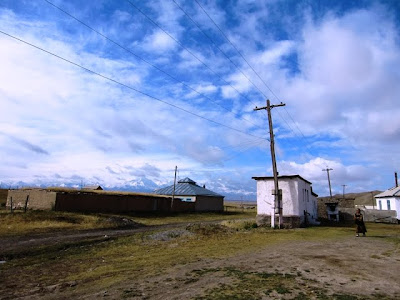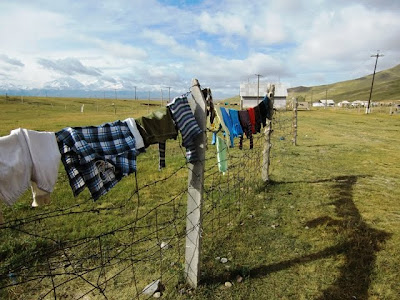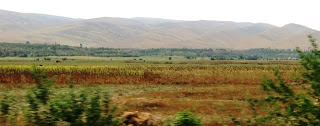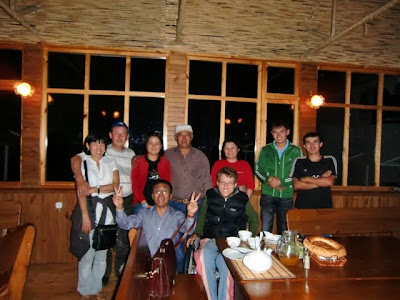
It was lucky I had found time to do some laundry in Osh and we had clean underwear for the last part of our Kyrgyz journey. Although initially we never thought we would need it, it ended up at times feeling like the most hair-raising and testing part of our stint in the Stans.
We had about 48 hours to get to the Chinese border via the small mountainous post of Sary Tash where we would sleep for two nights. Yet as we set off we were feeling prematurely at ease. Why? We had spent almost two weeks in a country which had quietly intimidated us with its’ travel warnings and mountain passes. But now we ‘felt like ‘crossing mountain-pass’ gurus having traversed two Kyrgyz passes successfully. What’s more we had less than 300 km to get to the border. The roads in Kyrgyzstan had been surprisingly smooth, the best in the Stans and locals claimed the road to China was even better and no problem for a 2WD. As a bonus, the weather would be cooler in the mountains, so we wouldn’t have to worry about Col sweltering in the heat with a broken window and fan. We were also heading back to remote yurt country and leaving what we believed to be the dangerous southern section behind. It seemed that all we had left to do was charge our camera batteries in anticipation of the ‘to die for’ scenery that awaited us and go.
In actual fact, we were ‘crossing mountain-pass’ work experience kids. It was indeed less than 300km to get to the border, although it ended up feeling like 1000km thanks to the pot holes, corrugated finishes and rain which ended up turning the barely passable roads into a dream getaway for any local pigs but a nightmare for a 2WD Miranda. The mountains were very cool, so cool in fact that the nomadic people had started dismantling their yurts and heading downhill, while the remainder appeared to be fending off hypothermia. Finally, the seclusion of the mountains had lured us into a false sense of security and while the scenery was indescribably stunning, at one point it literally was ‘to die for’ as we came close to experiencing our most frightening moment on the journey so far. This was the first time I was glad we had clean underwear and it occurred en route to Sary Tash.
It had been predictably dry in Central Asia. Apart from one fleeting storm in Kazakhstan, the last time we had seen rain was in Turkey, yet as we left Osh the typically blue sky was covered in looming rain clouds. We ignored this and enjoyed the good roads and scenery up into the Alay Mountain range. Flocks of sheep were being steered down the roads by horsemen, leaving a dusty silhouette behind. A gushing river in a gorge proved to be an irresistible setting for a cup of tea. The Cat Empire was cheerily blaring at us to ‘have some fun fun fun’ on the ipod. How could we refuse? But this relaxed vibe didn’t last long. Something was amiss and it came barrelling towards us at high speeds from the opposite side of the road, covered in mud. This lorry was unusually filthy and Col began wondering what lay ahead.


It didn’t take him long to find out. As we began climbing up towards our third Kyrgyz mountain pass – the Taldyk Pass - the road deteriorated abruptly into a gravelly dirt track posing as a section of the Pamir Highway. More unusually, those looming clouds opened up for the second time in two months, quickly turning the loose dirt on this steep slope into a mudslide. I had been excitedly reading up about Chinese cuisine, but as the rain got steadier and I noticed Col’s back wheels sliding and straining under the weight of our load, I knew something was very wrong and this was not going to be an easy pass for our 2WD Miranda.
Col was always my gauge for reading the gravity of a situation. Usually he was calm, cool and collected, in most situations even if he was a bit worried, but I could see from his body language that he was visibly and unusually stressed. My heart upped a beat as he purposely stopped on one of the flatter sections to have a serious talk. In a concerned, stern voice, he ordered me to de-clutter the front of the car and go and find a big rock to put there. He then warned that there was a good chance Miranda could lose all traction and begin sliding backwards out of control at which point I should grab the rock, slam the door shut and shove the rock urgently behind the tyre to avoid us tumbling backwards into danger. I could understand his concern.
The dirt track was getting muddier, steeper and uncomfortably narrow and had started forming hair pin bends so tightly, that we sometimes needed to do a three point turn just to turn the corner. There was barely enough room for two cars let alone a lorry and a car to pass each other; but because of the sharp incline and bends, it was impossible to see the next section of track and hence oncoming traffic until the very last minute. This would have been fine, except that this oncoming traffic consisted of Chinese lorries hurtling down the mountain like remote control cars operated by a 2 year old child with attention deficit disorder. Most unnervingly, the narrow track was precariously positioned on the side of a mountain with no fence guard to stop us, so while Col had to contend with out-of-control lorries to the left of us, he also had to steer well clear of the sheer cliff to the right of us. To make matters worse, because Miranda was only 2WD and the track was now so muddy and steep, Col had to do all of this by maintaining a constant speed, to avoid getting bogged, or -worst still- sliding uncontrollably backwards off the cliff; and added to this there was also the danger Miranda would overheat as she had done at high altitude on the aforementioned Otmok pass.

The next ten minutes seemed like the longest of our lives. Our hearts were thumping wildly, while Col concentrated, trying to maintain high revs and keeping his eyes firmly on the track. I kept pep talking Col and Miranda, with repeated rounds of “c’mon, C’MON, we can do it” while I gripped the door handle with one sweaty hand and held onto the rock tightly with the other. There were moments where Miranda’s back wheels skidded and slipped uncontrollably leaving deep skid marks in the mud, there were also a couple of near misses with lorries and one time when we really lost traction near the edge of the sheer road and almost started rolling backwards. The GPS altitude reader kept climbing and climbing and we wondered if we would ever reach the top, but fortunately we did thanks to a combination of Col’s great driving skills and a lot of good luck. As soon as we reached the top, an incredible feeling of relief waved over us, but we also needed to stop and have a few minutes to calm ourselves done and catch our breath.
It is hard to describe the gravity of the situation we found ourselves in that afternoon and the emotions we felt. In fact I have never been good at building suspense in my writing, so this may all seem a bit underplayed. But quite honestly, due to the fact that Miranda was loaded so heavily and wasn’t a four wheel drive vehicle, we felt that we very nearly didn’t make it. If it had rained any more heavily (or for any longer); if an oncoming lorry had approached us at the wrong time; or if something had forced us to stop suddenly halfway up the track, we honestly could have ended up in a very dangerous situation.
We didn’t stop for long. A fourth pass shortly followed, but with its’ flatter gradient and drier surface, it felt like crossing a speed hump compared to our last. So as we approached the remote town of Sary Tash nestled up high in the Tian Shan mountains, we were able to finally laugh about changing our underpants due to the skid marks we had probably left, but I think we also felt incredibly lucky to have made it through this stretch and felt a new found appreciation of being alive after our frightening ordeal.
Our next two nights were peaceful and spent in the small village of Sary Tash where we slept inside our car to shield us from the blistering cold outside. The mercury was well below 10 and this was only the start of September!



On a positive note, we were rewarded with 11,000 foot, 360 degree views of the incredible mountainous panoramas during the day. We were pleased with our makeshift shower cubicle in a hotel-less town– one pitched tent, with spade and a garden sprayer full of boiled water, where Col had a delightful shower, during a brief sunny spell. We were even treated to some delicious home cooked soup courtesy of the lady who had allowed us to camp outside her house. Everything seemed back to normal and that feeling of complacency had returned. That was the night before our drive over the Chinese border, but little did we know at the time, that tomorrow would end up being the second time I was glad we had packed clean underwear!


The morning before we crossed the Irkeshtam pass was one of excitement. We left in the pitch dark at 6am to get to the border in time before one of those Chinese border officials notoriously long lunches, but were once again feeling relaxed. We only had 90km left until the Irkeshtam pass, and we had exactly five and a half hours contingency driving time up our sleeves, the road was apparently in much better condition than the last and suitable for a 2WD and the weather had cleared, so even if the roads were corrugated dirt tracks, they would have little chance to turn into a muddy mess.
Any memory of our last mountain pass ordeal was easily forgotten thanks to one of the most beautiful sunrises we had ever witnessed at 12,000feet. We were driving above the clouds and were literally on top of the world. The colours at sunrise were amazing and we felt like explorers discovering a new country. This feeling of elation lasted for most of the morning and somehow unbeknownst to us, we traversed our final Kyrgyz mountain pass during this time on a corrugated but otherwise passable road. Before we knew it we were descending towards the border, waving our passports and had been cleared through our first round of border checks. . We had made such good time, that we were going to impress the pants off the Chinese and our new guide Louis Long with our punctuality. In fact we were making such good time that we would even have time for a leisurely breakfast cereal stop before our first Chinese checkpoint.


We were now in no-man’s land and loving it. It was the largest, most impressive no-man’s land I had ever seen with a fast flowing river, backed my mountains and valleys which looked like they could have auditioned to be on the set of the Grand Canyon. In fact I was so blown away by the clearness of the water, that I immediately alerted Col to look over at this beautiful sight. In the next ten seconds Col made two swift movements that I remember. He turned his head sharply to the left to check out the water I was raving about. He then turned his head sharply back to the right, wondering what that god awful thud was coming from the bottom of the car.
It all happened so quickly. I had distracted Col and in that moment he had been crossing a bridge. The road was not perfect and we had definitely seen worse, but as we bumped off the ridge of the bridge, a speed bump shortly followed. It was here in between the ridge and speed bump that a massive rock cheekily lay hiding. It was so well disguised that looking back afterwards at the scene of the crime, we could still barely see it. That didn’t matter because this rock had already done the damage.

The metal guard which typically protects the underside of the car from knocks and bumps had tried to take on the mother of a rock, but the rock had been that big, that as we drove over it, it bent the guard backwards, so that it was now rubbing up against our drive shaft and preventing it from spinning freely. I must admit I don’t know much about cars and to some people this description might not seem that dire, but in layman’s terms we were up shit creek without a paddle and actually… without a boat. i.e. it was impossible to move. At this point I was glad that we had packed so many clean pairs of underwear, because at the outset it may not have been a matter of life or death but it seemed like we were going nowhere anytime soon.
Col and I were both stunned, but for some reason despite this massive dint to our fabulous morning, we both remained quietly composed. Perhaps subconsciously we had remembered that things happen for a reason and have a way of working out. Testament to the lack of reception on our mobile phones, we were not only in no mans land, but owing to the massive distances between one check point to the next, we really did feel like we were in the middle of nowhere. Kashgar – the first city on the Chinese side of the border and Osh, the city we had left behind were an equidistant 300km away. We needed to cross the border today as the Chinese were expecting us and our permits were very inflexible. However, we couldn’t get to a mechanic and we couldn’t be towed because of our automatic transmission and even if a mechanic could get to us, whose responsibility were we…the Kyrgyz or the Chinese? Would they need a visa to come and help us? They couldn’t just leave us here could they? Someone would come to help us, wouldn’t they? Louis Long would at the least come to find us…right?

Just as I begun having amusing visions of living in No Man’s land (like Tom Hanks in that movie where he had to live in an airport departure terminal, because his passport was invalid) a lorry pulled up and the driver began striding towards us. Lorry drivers may think and act like they own the road and infuriate all other drivers with their daredevil moves and disregard for road rules, but outside of their vehicles these guys are some of the friendliest, down to earth guys on earth. This short and stout lorry driver from Tajikstan, with a moustache that would kick ass in a Movember contest, was no exception.
He had such a casual and friendly demeanour, that it seemed like rescuing foreigners from mechanical troubles, was one of his hobbies. With a quick glance under the car, he knew what to do. He brought out his picnic blanket and opened it out next to the car, calmly laying his tools nearby, he then grabbed Col’s shower chair, placed it in the middle of the road as a road block and hailed down some of his other lorry-driving mates. In no time we had indirectly caused a massive lorry traffic jam which seemed to stretch to the horizon, but no one was irate. We were surrounded by about twenty lorry drivers, who seemed to be treating our vehicle breakdown as an opportunity for an early office christmas party. Drivers were catching up with other drivers, many had lit up a cigarette and some were just curious and interested in looking at Col’s hand controls. No one seemed in any rush to get to China.
Of course about six of the lorry drivers had remembered our dilemma, looked under our car and seemed to be in charge of coordinating our rescue operation, which was directed by our Tajik lorry driving mate. In no time at all they had found a rope, tied one end to our bent metal guard and the other end to a twenty tonne lorry. I could see Col. He had turned white at the sight of his beloved Miranda being manhandled so roughly, but he and I both had a good feeling that their plan would work. It did. As the lorry lurched forward, we heard the expected creak of a metal guard bending back into place and that’s all.
The car, particularly the drive shaft would still need to be inspected at a latter date, but when Col road tested Miranda, she glided forwards slowly like “an old lady after having her pants pulled down” (Javens, C, 2010). Miranda was fixed and all the lorry drivers cheered in unison, as though their football team had just won the world cup or their wives had given birth for the first time, before jumping back in their respective lorries and speeding off in an impatient flurry.
We couldn’t believe our good luck and were grinning from ear to ear. We were well on one our way again and felt unstoppable. (Ok well, we still stopped for ten minutes to fill up with fuel and quickly nail some breakfast cereal, but it didn’t matter as we were still on track). After blagging our way through remaining Kyrgyz custom formalities, we arrived promptly outside the Chinese border gate at 11.05am along with most of the lorry drivers. Ordinarily this would have been perfect as the border guard’s lunch break didn’t officially start until 11.30am, but for some reason, they were feeling burnt out and decided to give themselves an early mark. All our early morning efforts were in vain and so there was not much to do, but spend a good part of a day hanging with all the entertaining lorry drivers, who were still bragging to each other about their role in fixing Miranda.

When the Chinese did finally open the gate, they subjected us to the most militaristic border crossing to date. The soldiers posing as border guards searched Miranda like hounds on the scent of hashish. Out went my 5L back up stash of cereal milk, onions and fruit. They even forced me to rip out the map of Taiwan from my Chinese Lonely Planet in front of them, as an alternative to confiscating my book entirely, as they believed that Taiwan had been incorrectly labelled as a separate country from China. Luckily they never found our satellite phone casually sitting in the front of the car. They also gave up looking for anti-Chinese propaganda on Col’s laptop as they got fed up waiting for it to boot up, which meant we gained half an hour.
During the rigmoral, we eventually met our guide (luckily he was only 40kg and not the 150kg sumo wrestling champion with an appetite for all things edible, that we had comically envisioned). We also met our local guide, who was there to smooth the customs process, but ended up complicating things by suggesting that it was less suspicious if I drove Miranda out of the border, as the Chinese officials were still wary of hand controls and had banned Chinese people with disabilities driving in China. Luckily we talked him out of this idea and after a few more bungled formalities and another hour spent chasing up lost paperwork Col and I were finally free to enter China. If Col didn’t love Miranda as much as he did and he was driving some old beaten up bomb, I am sure he would have raced our of there, leaving a nice pair of skid marks just outside the final checkpoint.
Our drive from Osh over the Irkeshtam pass was probably one of the most amazing and terrifying drives we have ever been on in our lives with scenery I previously assumed you could normally only find from an arduous five day trek through the Himalayas. The border crossing itself was one of the most spectacular, complicated and equally arduous we had ever encountered. But, Kyrgyzstan had impressed the pants off us and we hope we will inspire others to visit. Just remember to pack your clean underwear!




















































